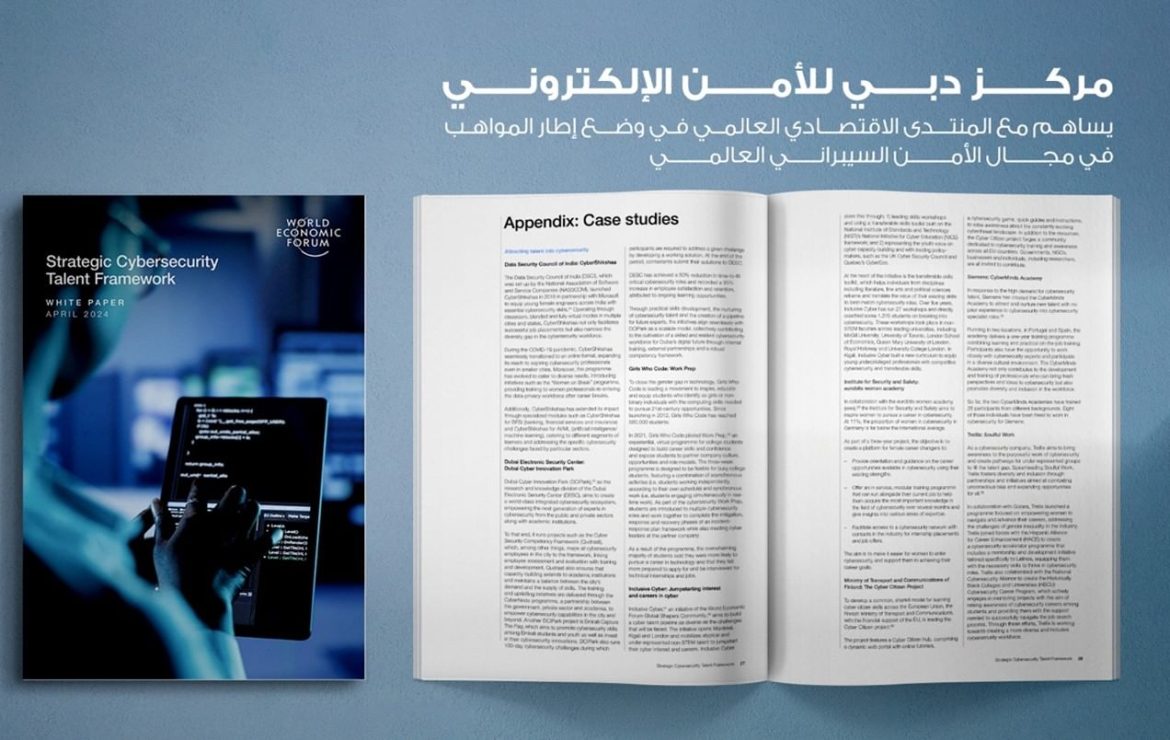The World Economic Forum (WEF) has praised Dubai’s efforts in attracting and developing talent in the field of cybersecurity, highlighting the achievements of the Dubai Electronic Security Center (DESC) and its various initiatives.
Among these is the “Dubai Cybersecurity Innovation Park,” which aims to provide a comprehensive ecosystem to prepare the next generation of cybersecurity experts.
Another notable initiative is the “Qodorat” Cybersecurity Competency Framework, cataloguing all the skills and talents available in Dubai’s cybersecurity sector.
This recognition was featured in the WEF’s “Cybersecurity Talent Framework” report released earlier this year. DESC continues to enhance its global presence and strengthen its collaborative relationships with strategic international partners.
Moreover, the centre has played a significant role in shaping this framework, reaffirming Dubai’s leadership in cybersecurity and reflecting its ongoing commitment to expanding its positive impact on the global stage across various sectors, including the critical area of cybersecurity.
This field has become one of the key pillars supporting a secure digital environment that underpins comprehensive and sustainable development efforts.
The World Economic Forum
Furthermore, the World Economic Forum acknowledged the efforts of the members of the “Cybersecurity Skills Gap Initiative” and the team at DESC, commending their contributions, insights, and expertise, which were instrumental in the creation and launch of this framework. This was the result of extensive efforts and intensive meetings with various partners. The DESC team, which includes Dr Bushra Al Blooshi, Aisha Mohammed Al Marzouqi, Maitha Khalid Al Muhairi, Sheikha Issa Al Muhairi, Zaina Nasser, and Moza Majid Al Falasi, demonstrated the highest levels of competence and active contribution to this project.
The announcement of the Cybersecurity Talent Framework came as part of a partnership between Dubai, represented by DESC, the World Economic Forum, and 50 other entities globally from both the public and private sectors. This framework serves as a practical guide to help organizations address the global shortage of cybersecurity talent, which is expected to reach nearly 4 million specialists. It also aims to build sustainable partnerships that support talent development in this field.
H.E. Hamad Obaid Al Mansoori, Director-General of Digital Dubai, stated, “We are working under an integrated strategy that aims to position Dubai as a global hub for exceptional talents and a centre for innovation and creativity, especially in vital sectors closely linked to the efforts of comprehensive economic development in the UAE.” He added that international partnerships are a powerful tool to drive cybersecurity efforts toward higher levels of excellence and stability. “We are working in line with the vision and guidance of our wise leadership to intensify collaboration and coordination with relevant institutions and entities. Developing and refining the necessary skills in digital and cybersecurity fields is an integral part of our plan to prepare the next generation of national talents capable of meeting the requirements of digital transformation in the country and supporting the ongoing efforts in this domain.”
H.E. Yousuf Hamad Al Shaibani, Head of Cybersecurity for Dubai, added, “Cybersecurity is the backbone of digital transformation and the foundation for building a comprehensive operational framework and reliable infrastructure capable of keeping pace with the rapid developments in this vital sector. The Dubai Electronic Security Center is committed to continuing its efforts to enhance Dubai’s presence and position as the safest city in cyberspace by preparing and developing young talents and equipping them with the necessary skills and technologies to achieve this goal.” He continued, “We look forward to continuing our work with partners, both domestically and internationally, to develop the plans and mechanisms required to maintain leadership in this field and stay abreast of its latest advancements.”
The framework released by the World Economic Forum focuses on key areas, including how to attract more talent into cybersecurity by improving understanding of the roles and tasks of cybersecurity professionals, removing barriers to entry, enhancing diversity in the workforce, and improving the quality of education and training in cybersecurity to equip students and professionals with essential skills. It also highlights the need to rethink hiring practices by addressing challenges such as unrealistic job requirements and mismatches between hiring managers and human resources departments.
Dr. Bushra Al Blooshi, Director of Governance and Risk Management at DESC, stated, “The centre is an active partner in global efforts to enhance cybersecurity standards and safety. We take pride in having Emirati talents capable of contributing to policy-making and conducting studies that support the World Economic Forum’s efforts to develop talents in this field. The digital economy is a fundamental component of the global economic system, and its growing importance necessitates keeping pace with continuous developments and preparing qualified personnel.”
She added, “Studies show a global shortage in cybersecurity skills, with a gap of approximately 4 million specialists, coupled with an annual increase in demand for these skills due to the widespread adoption of digital solutions and technologies by companies and entities across various sectors. Therefore, collaboration and coordination in this field emerge as ideal solutions to these challenges.”














